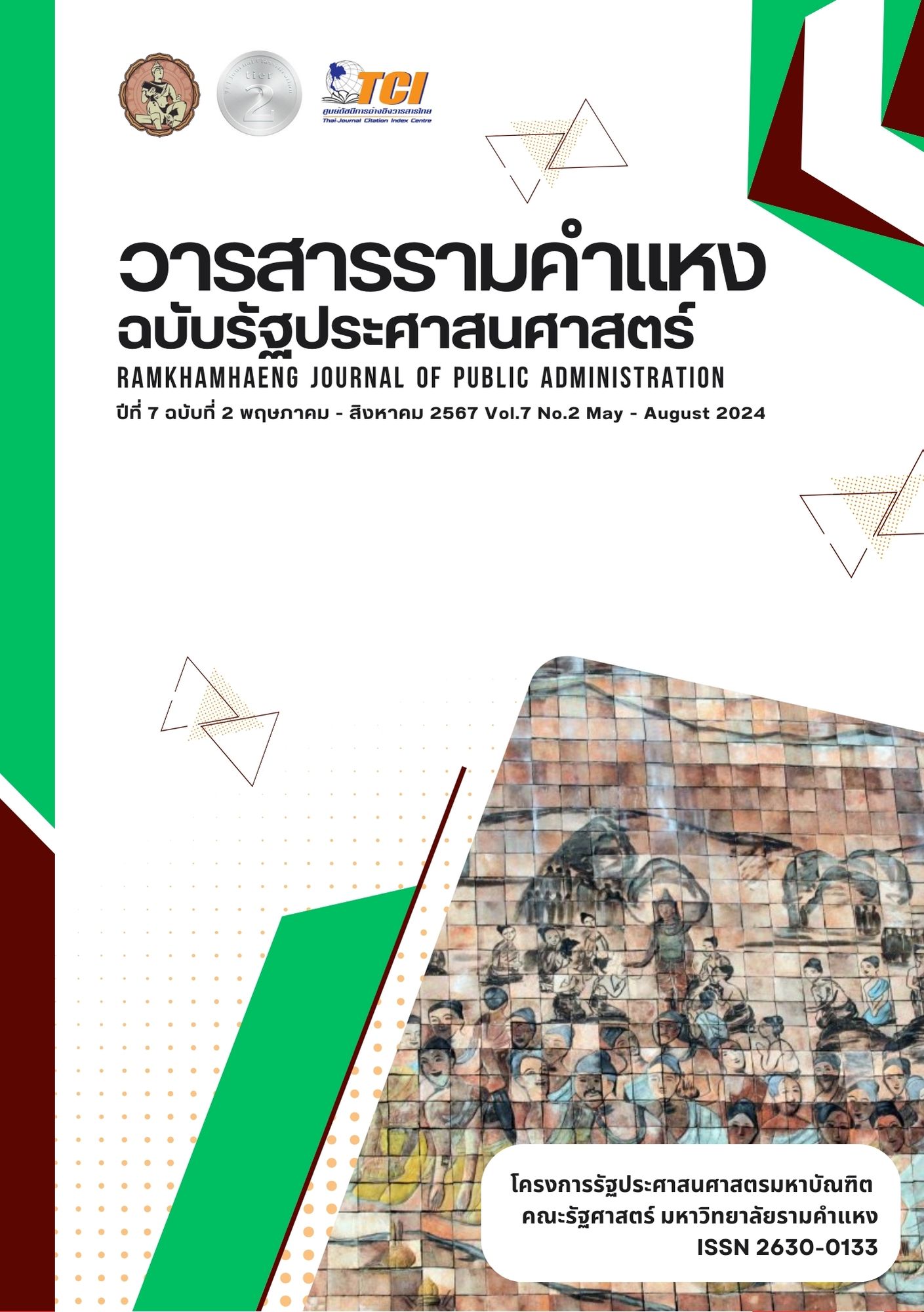Election strategies of political parties in line with the 20-year National Strategic Plan
Keywords:
20-Year National Strategy, Election Campaign, Election, Political partyAbstract
At present electoral dynamics rely on strategies and high-quality policies that resonate with the public to help political parties and politicians achieve success. At the same time, political party policies presented to the public must align with the National 20-Year Strategy. Therefore, in order for political parties and politicians to have a successful chance of winning in the elections, their campaigning strategies and policies must resonate with and appeal to the people as much as possible. Political parties should study various political strategies and theories, as well as adapt modern technologies, online media, and different platforms to aid in their campaign efforts in order to gain support and votes. This also includes gaining support through local popular strategies used by politicians in certain areas, such as local influential figure or political dynasty. This article aims to study the patterns of gaining support, provide guidelines for developing campaign strategies, and address various challenges and obstacles faced by political parties in their campaigning efforts. By collecting data from four relevant groups, including politicians, government officials, businessperson, and the general public, In order for political parties to truly adopt policies that meet the needs of people across all professions. Moreover, these policies must align with the 20-year National Strategic Plan, be modern and in line with current conditions, and not violate the law. Ultimately, the formulation of high-quality policies will not only directly benefit the people but also serve as a driving force for the nation to move in the right direction, adapting to current circumstances. Moreover, political parties that have quality policies have a better chance of success than other political parties and may have the opportunity to form a government to drive the country forward in the future.
References
ธนการ ดำรงรัตน์. (2562). หลักนิติธรรมกับนโยบายสาธารณะของพรรคการเมืองไทยในช่วงการเลือกตั้งปี พ.ศ. 2562. กรุงเทพฯ : สำนักงานศาลรัฐธรรมนูญ.
นิรัตน์ เพชรรัตน์, อัญมณี ชูมณี, อภิชาติ มหาราชเสนา และสมชาย สาโรวาท. (2564). กลยุทธ์การรณรงค์หาเสียงเลือกตั้งของนายกองค์การบริหารส่วนจังหวัด. วารสาร มจร การพัฒนาสังคม, 6(1), 153-160.
นันทนา นันทวโรภาส และ รหัส แสงผ่อง. (2562). การรณรงค์หาเสียงเลือกตั้งของพรรคการเมืองภายใต้รัฐธรรมนูญปี พ.ศ.2560: ศึกษากรณีการเลือกตั้งทั่วไป วันที่ 24 มีนาคม 2562. วารสาร มจร สังคมศาสตร์ปริทรรศน์. มหาวิทยาลัยมหาจุฬาลงกรณ์ราชวิทยาลัย. 8(2), 274-288.
ปณิชา ชาญฤทธิเสน, สุภาภรณ์ ศรีดี, หฤทัย ปัญญาวุธตระกูล และ จิตราภรณ์ สุทธิวรเศรษฐ์. (2566). กลยุทธ์การตลาดทางการเมืองในการหาเสียงเลือกตั้งของ ผู้สมัครสมาชิกสภาผู้แทนราษฎรหน้าใหม่ที่เป็นสตรรีของพรรคพลังประชารัฐใน เขตกรุงเทพมหานคร. วารสารสังคมและวัฒนธรรม มหาวิทยาลัยสุโขทัยธรรมาธิราช, 7(1), 305-324.
ปวีร์ เปาริก. (2555). ฟุตบอล นักการเมือง กับการสร้างฐานรูปแบบใหม่ในการเมืองไทย. ภาคนิพนธ์รัฐศาสตรมหาบัณฑิต, มหาวิทยาลัยธรรมศาสตร์.
พรรชรนันท์ สายจันดี, ธรรมนิตย์ วราภรณ์ และชัยยศ จินารัตน์. (2565). การรับรู้ทางการเมือง การกล่อมเกลาทางการเมือง และการมีส่วนร่วมทางการเมืองของเยาวชนในประเทศไทย. วารสาร Journal of Buddhist Philosophy Evolved มหาวิทยาลัยการจัดการและเทคโนโลยีอีสเทิร์น, 6(1), 26-40.
ไพศาล นภสินธุวงศ์. (2564). สงครามและกฎการสงคราม (War and Principles of War). นาวิกาธิปัตย์สาร คลังปัญญาผู้นำ, ค้นเมื่อ 17 พฤษภาคม 2567, จาก http://www.navedu.navy.mi.th/stg/tnssc/pdf/79-sk.pdf
ภูริวัจน์ ปุณยวุฒิปรีดา. (2564). การกำหนดนโยบายของพรรคการเมืองไทยตามรัฐธรรมนูญพุทธศักราช 2560. วารสาร มจร การพัฒนาสังคม. มหาวิทยาลัยมหาจุฬาลงกรณ์ราชวิทยาลัย. 6(3), 264-276.
ระเบียบคณะกรรมการการเลือกตั้งว่าด้วยวิธีการหาเสียงและลักษณะต้องห้ามในการหาเสียงเลือกตั้งสมาชิกสภาผู้แทนราษฎร พ.ศ. 2561. (2562, มกราคม 11). ราชกิจจานุเบกษา, 136(6ก), 6-12.
รัฐธรรมนูญแห่งราชอาณาจักรไทย พุทธศักราช 2560. (2560). ราชกิจจานุเบกษา, 134(40ก), 17-20.
วิกิพีเดีย, สารานุกรมเสรี. (2567). ประวัติจักรพรรดินโปเลียนที่ 1. ค้นเมื่อ 17 พฤษภาคม 2567, จาก
https://th.wikipedia.org/wiki/จักรพรรดินโปเลียนที่ 1.
วิกิพีเดีย, สารานุกรมเสรี. (2567). ประวัติพระเจ้าฟรีดริชที่ 2 แห่งปรัสเซีย. ค้นเมื่อ 17 พฤษภาคม 2567, จาก https://th.wikipedia.org/wiki/ พระเจ้าฟรีดริชที่_2_แห่งปรัสเซีย
วัชรเดช เกียรติชานน. (2565). ยุทธศาสตร์ชาติกับนโยบายการพัฒนาประเทศ. วารสารสังคมศาสตร์เพื่อการพัฒนาท้องถิ่น มหาวิทยาลัยราชภัฏมหาสารคาม. 6(4), 319-326.
สรียา ทับทัน. (2565). ปรากฏการณ์การสื่อสารทางการเมือง:แง่มุมการศึกษา การตลาดและภาษา. วารสารครุศาสตร์อุตสาหกรรม สถาบันเทคโนโลยีพระจอมเกล้าเจ้าคุณทหารลาดกระบัง. 21(2), A1-A13.
สุเมธ ตั้งประเสริฐ. (2565). กลยุทธ์และวิธีการสื่อสารของพรรคการเมืองไทยผ่านสื่อสังคมออนไลน์ในการเลือกตั้งทั่วไป พ.ศ. 2562. วารสารรัฐศาสตร์ มหาวิทยาลัยราชภัฏสวนสุนันทา. 5(1), 34-35.
อริน เจียจันทร์พงษ์. (2565). กระบวนการทางการตลาดและการสื่อสารการเมืองของพรรคการเมืองไทย: ศึกษาการเลือกตั้งทั่วไปครั้งที่ 28 ของประเทศไทย (วันที่ 24 มีนาคม 2562). วารสารนิเทศศาสตร์. 40(3), 123-153.
Barton, J., Castillo, M. & Petrie, P. (2014). What Persuades Voters? A Field Experiment on Political Campaigning. The Economic Journal Oxford University, 124(574), F293-F326.
Cleary, Thomas. (2005). Sun Tzu, The Art of War. Boston: Shambhala Publishing.
Esser, Frank and Barbara Pfetsch. (2004). Comparing Political Communication, Theories, Cases and Challenges. Cambridge: The Press Syndicate of the University of Cambridge Publishing.
Lipset, Seymour Martin. (2017). Political Parties: A Sociological Study of the Oligarchical Tendencies of Modern Democracy. New York: Routledge Publishing.
North, Barbara and Robert North. (1967). Political Parties Maurice Duverger. London: Lowe & Brydone (Printers) Ltd.
Newman, Bruce I. (1994). The marketing of the president: Political marketing as campaign strategy. (1st Ed.). London: Sage Publishing.
Öztürk, Resul and Suzan Coban. (2019). Political Marketing, Word of Mouth Communication and Voter Behaviours Interaction. Business and Economics Research Journal, 10(1), 245-258.
Strohmeier, Gerd. (2013). How to win in modern electoral campaigning. European View. 12(1), 51-58.
Downloads
Published
How to Cite
License
Copyright (c) 2024 Pawee Paorik

This work is licensed under a Creative Commons Attribution-NonCommercial-NoDerivatives 4.0 International License.



